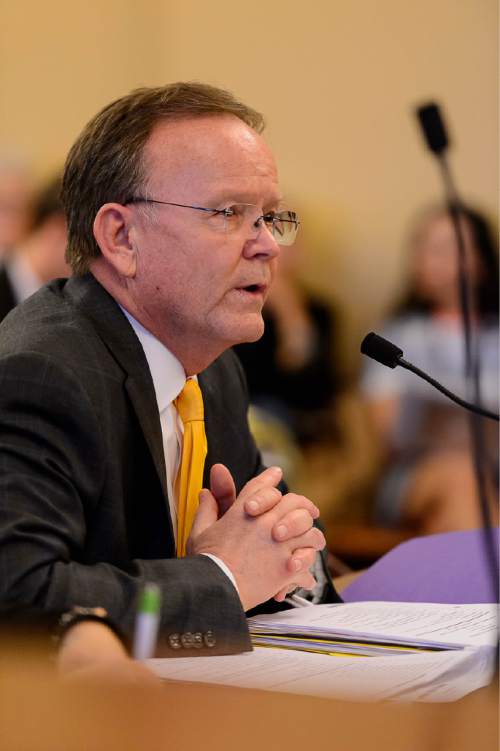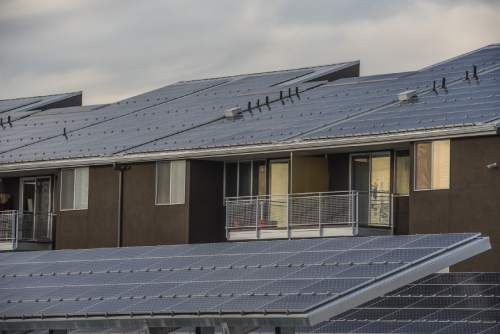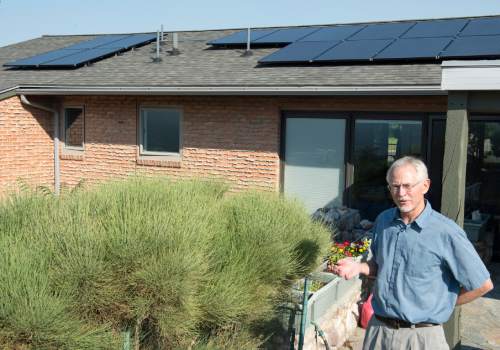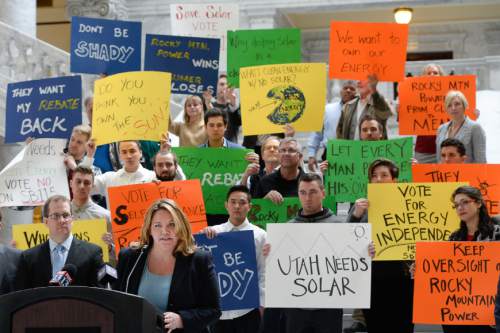This is an archived article that was published on sltrib.com in 2016, and information in the article may be outdated. It is provided only for personal research purposes and may not be reprinted.
The controversial bill tied to Rocky Mountain Power's STEP initiative is on its way to the House floor after a narrow committee decision, with many of the bill's opponents backing away from the discussion and lawmakers saying it's still unclear how portions of the bill will affect the utility's customers.
Members of the House Public Utilities and Technology Committee questioned whether state legislators had access to the information and expertise necessary to make an appropriate decision on SB115, which would provide funding for the utility's Sustainable Transportation and Energy Plan and restructure energy rates.
But repeated attempts to subject the bill to further research and oversight were narrowly defeated, and the bill eventually received an equally slim favorable recommendation in a 6-5 vote.
Rep. Patrice Arent, D-Millcreek, who ultimately voted against the recommendation, suggested rewriting the bill to give the Public Service Commission — the three-person board that oversees Utah's utility companies — more authority to determine which parts of SB115 ought to be implemented.
"It's a complicated bill," said Arent,. "I used to draft this legislation, and I'm having trouble following this … I want the expertise of those who really do understand this."
Public comment on the bill also featured a lengthy debate about the appropriate role of the Public Service Commission. The commission considers the interest of the public fairly, bill opponents said, while the legislative process is more beholden to lobbyists.
"I want to tell you right up front that this is not your policy — this is Rocky Mountain Power's policy, and what they're doing is asking you to sanctify it," said Claire Geddes, a longtime legislative watchdog. "This is very unfair to consumers. Your constituents are going to pay the bill for this, but [RMP has] all the power."
Several major environmental and industry groups who strongly opposed the bill at the outset were notably absent from Tuesday's debate. The bill's sponsor, Sen. Stuart Adams, R-Layton, said a series of lengthy negotiations with stakeholders have resulted in amendments to the bill that have placated many of the offended parties.
Those who have withdrawn their opposition stressed that they still do not necessarily support the bill.
"We, unfortunately, have become neutral on the bill," said Kelly Francone, executive director of the Utah Association of Energy Users. "We do not actively oppose it."
Francone said the Utah Association of Energy Users had feared SB115 was destined to pass despite widespread opposition, and so opted to meet with the bill's sponsor to negotiate for amendments that would protect utility customers. They were able to secure several key changes, such as a sunset date in 2019 that would automatically repeal some untested components of the bill. In exchange, Francone said, the association had to promise it would no longer actively campaign against the bill.
But the Utah Association of Energy Users does not support the bill either, she said, and is especially concerned about the way the bill proposes to restructure electrical rates for Rocky Mountain Power's Utah customers.
On a yearly basis, the utility projects its costs for generating energy, then reports the actual costs a year later. Under the current agreement, if the company's actual costs are higher than projected, 70 percent of the overage is passed on to ratepayers, and 30 percent is absorbed by the company.
If costs are less than projected, the company keeps 70 percent of the extra profit, and ratepayers receives 30 percent.
Francone said the latter scenario hasn't happened in five years because RMP has "under-forecasted" its costs.
SB115 proposes to change the arrangement so that the Rocky Mountain Power could pass 100 percent of cost projection overages to its customers.
Opponents of the bill say this allows the power company to shift all the risk associated with its operations to the customers.
Jeff Larsen, vice president of regulation and government affairs for Rocky Mountain power, said the change was necessary to help the company manage costs and pursue experimental technologies, such as battery storage, that would ultimately benefit customers.
The bill also offers environmental concessions, such as offering incentives for electric vehicles and giving the Public Service Commission the ability to shut down Rocky Mountain Power's Gadsby facility, a natural-gas-fired power plant located in Salt Lake City, during wintertime inversions.
But that doesn't mean SB115 should be classified as an "air quality bill," said Matt Pacenza, executive director of HEAL Utah.
"People want to see this as a clean air bill," he said, "but the measures in there are pretty modest."
HEAL Utah continues to openly oppose the bill, though Pacenza said the recent amendments have made it more palatable.
Other groups find themselves unable to decide whether they should change their position on the bill. Ashley Miller, program director for Breathe Utah, said she felt the bill needed to be more thoroughly researched.
"There are so many uncertainties with this piece of legislation," she said. "We think that it needs a lot more study, and a lot more time, devoted to it, before we would be willing to support the bill — and before we think anyone should support the bill."
But amendments that restrict the 100 percent risk-sharing arrangement to a three-year pilot program and make concessions for the solar industry do make the bill more attractive, Miller said — enough so that the opposition has begun to waver.
"There has been great success in peeling off opposition to this bill," she said, "With the added little caveat that most of these groups are not supporting this bill — they're just going neutral."
Twitter: @EmaPen









